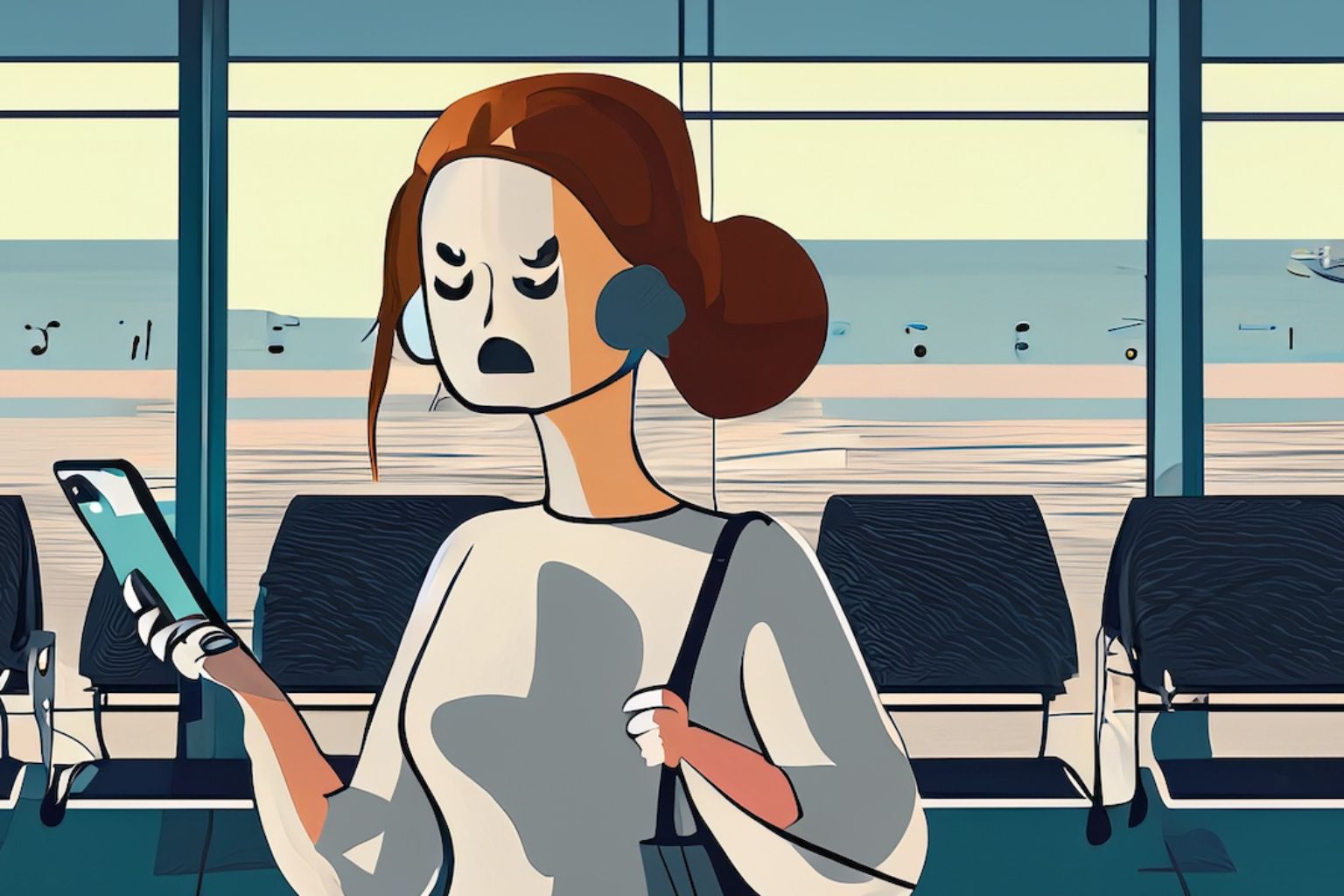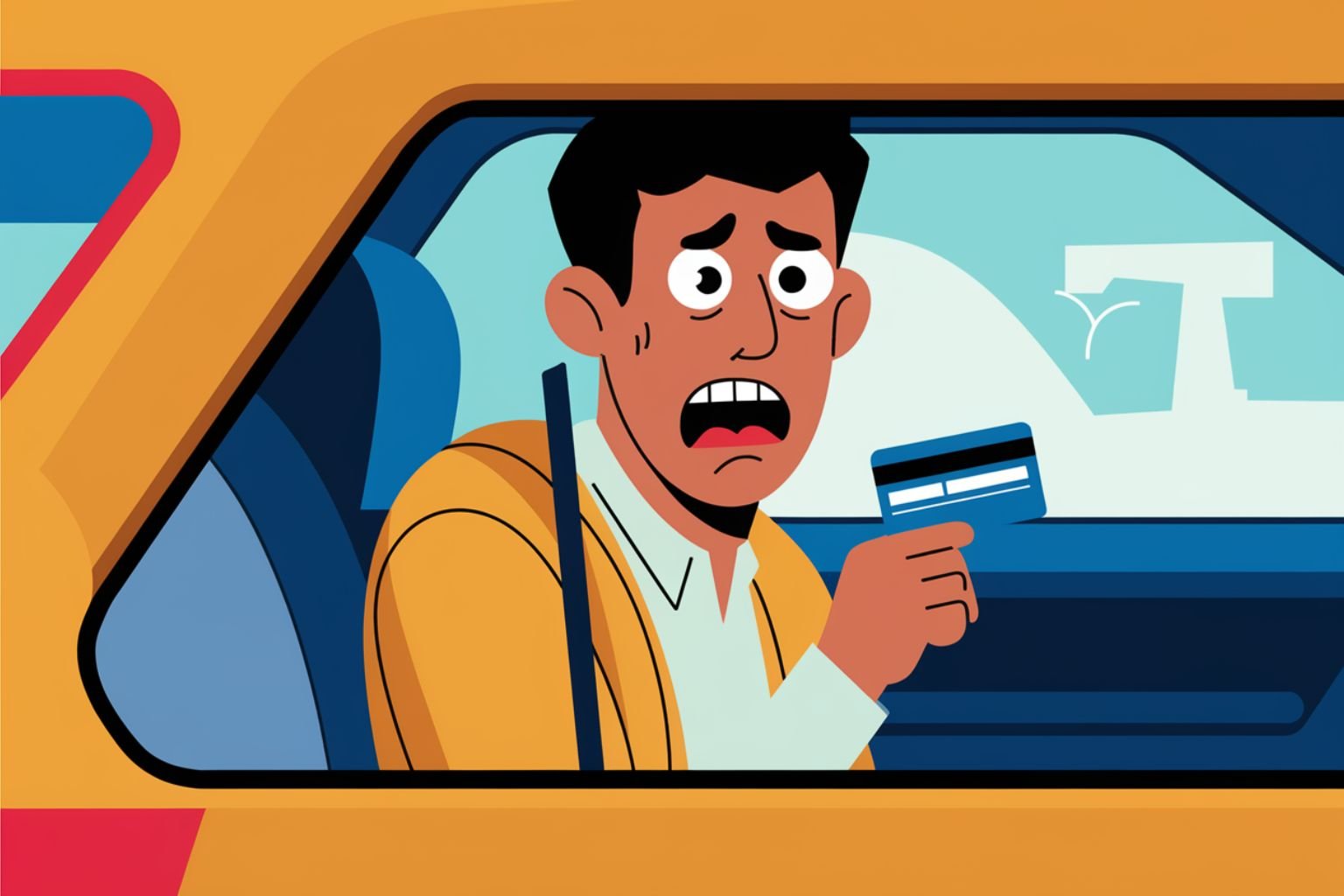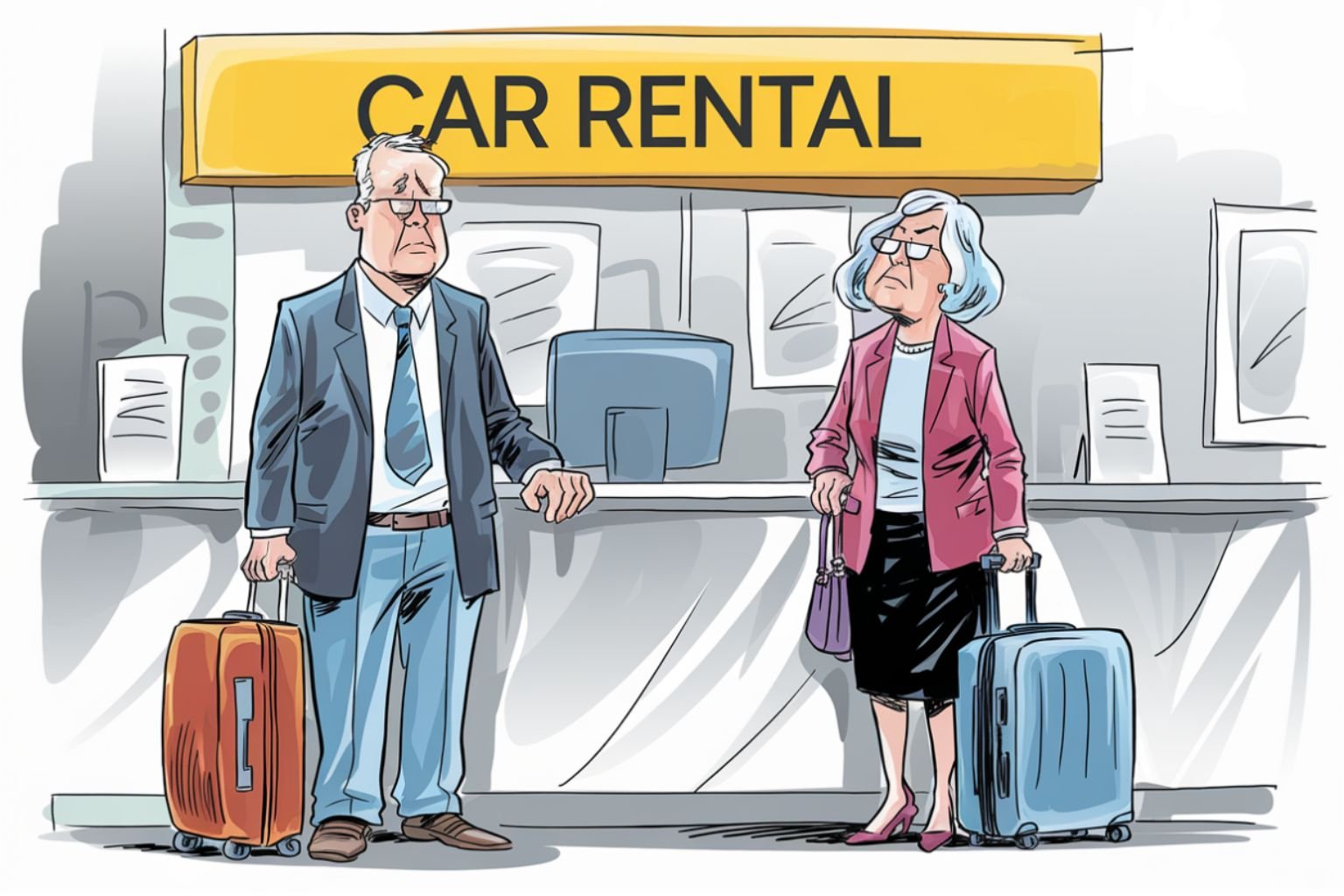When Laurie Mannino tried to change her airline tickets on British Airways, she ran into a common problem: The airline kept her on hold for hours.
So she Googled “talk to a human at British Airways” and found a number that picked up on the first ring.
It was a fake.
Mannino had fallen for a recurring airline scam — a website with a number that claims to be a call center for an airline. She talked to a representative named Abjeel, who eventually took her for thousands of dollars. But there’s plenty of blame to go around for this one, including British Airways and even Google. That’s right, I’m taking Google to task for this one, and you won’t believe what it told me.

Here’s how the scammers took $3,184
Mannino wanted to change an airline ticket from Washington, D.C., to Cork, Ireland. First, she called the British Airways 800 number and spoke with a representative who said she could make the change, but not now. She asked her to call back 72 hours later.
“When I called back, I didn’t want to be on hold forever, so I searched ‘talk to a human at British Airways’ on Google,” she says. (Related: Is this a scam? “US Airlines” is offering me two roundtrip airline tickets.)
An “802” number popped up at the top of her search.
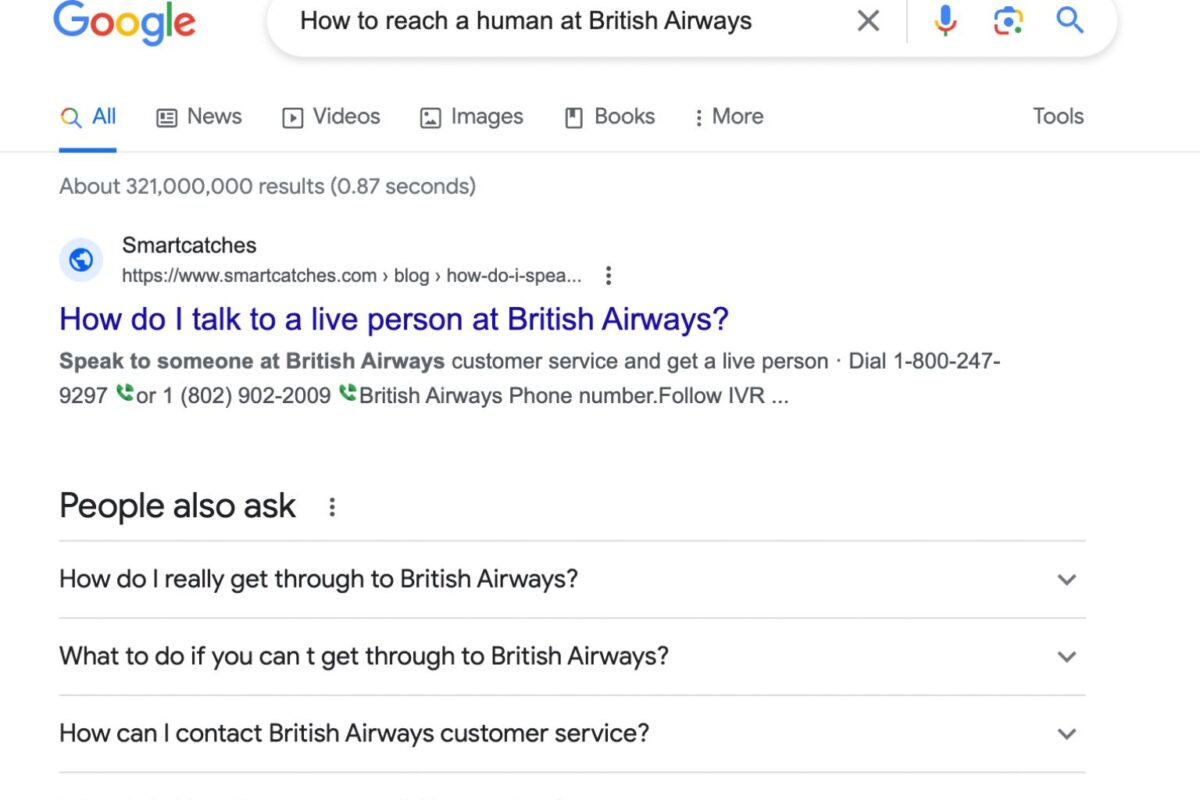
The 802 area code is in Vermont, but it’s also a favorite of scammers because it’s so close to 800.
A search of this type also returns phone numbers for Lufthansa and China Eastern Airlines in area code 802.
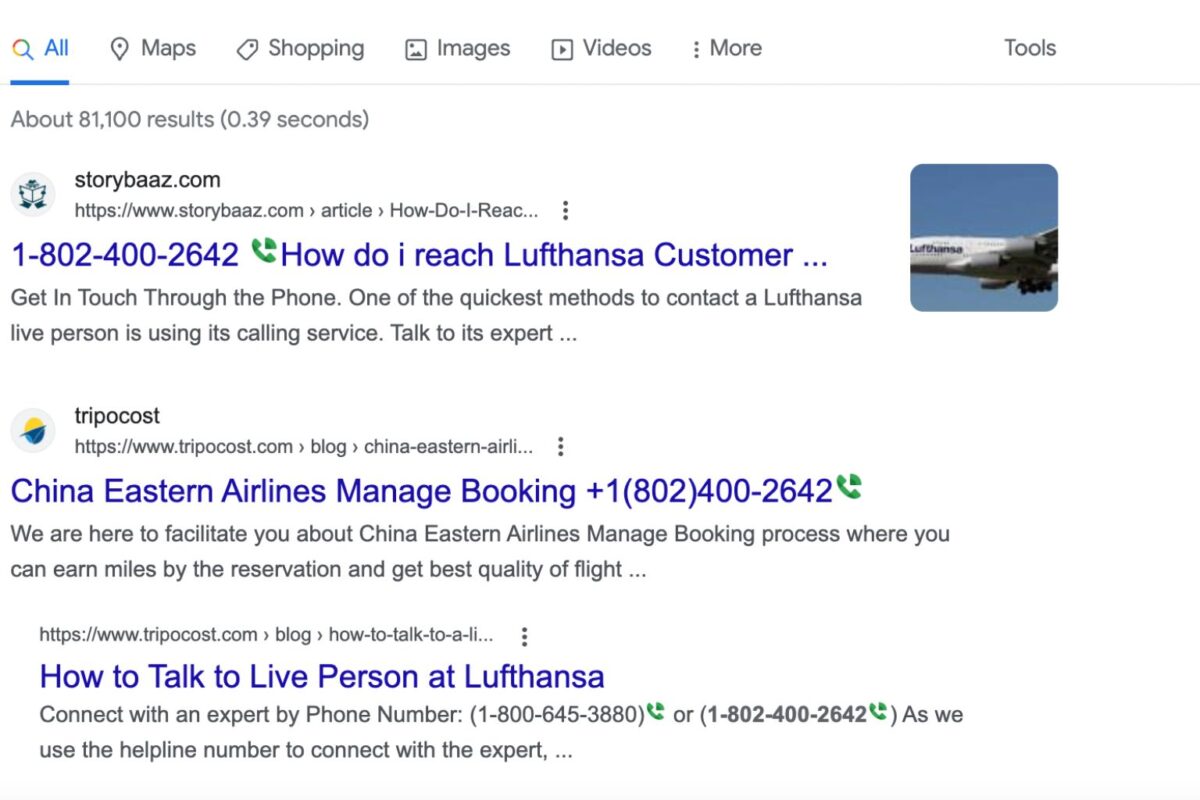
“I reached a man who said he was an agent for British Airways and he could make the change,” she says. “Thirty minutes later, another man who claimed to be his supervisor called me and said it would cost me to make the change.”
Mannino reluctantly agreed to allow Harold, a “British Airways supervisor,” to charge her credit card $3,184.
But later, when she phoned the real British Airways to verify the ticket change — you guessed it! — it said she didn’t have a record of a change request.
Her $3,184, charged to a mysterious company called Airticket World, was gone.
“I was the victim of a scam by two people claiming to be British Airways agents,” she told me.
Mannino wants to fix her ticket and get her money back. Can she?
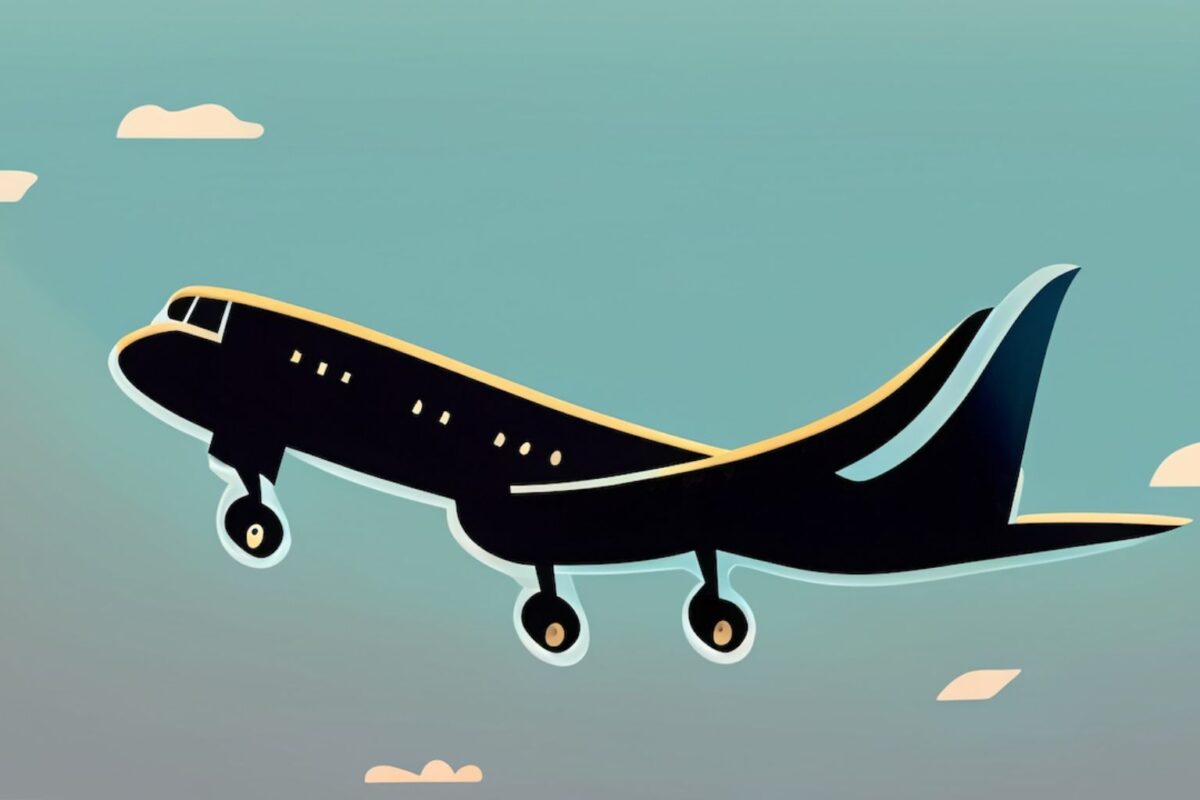
A brief history of the airline reservation number scam
The airline call center scam is an older travel scam. So old, in fact, that I thought it had gone extinct. But no!
Most airlines take half an eternity to connect you to a real person by phone, and some don’t connect you at all. That’s where the scammers come in. They manipulate the search engines to place their pages at the top of the search results, they prey on impatient passengers.
The scam has proliferated in the last decade, but it had almost disappeared around 2020. What happened? The likeliest explanation is that Google, the dominant search engine, changed its algorithm to push search results from these scammers so far down that it practically neutralized them. (Related: How can I get a shuttle refund without getting scammed?)
If that is true, then another algorithm change probably revived them. Google recently revamped the way it searches websites, pushing some websites lower in its search results, and some higher. Although it’s impossible to know for sure what happened, it appears that these scammers benefitted from the latest algorithm change.

How the call center airline scam works
The call center scam works by placing a fake customer support number online.
- If you call the number, it does not go to a phone tree, as it would with an airline customer support number. Normally, someone with a heavy accent answers “reservations center” or some other generic greeting.
- When you ask if this is the phone number for British Airways, they say yes. If you express misgivings about the call, a representative will try to tell you the airline subcontracted some of its work, which is why you are dealing with an overseas call center.
- From there, the scam can go in any direction. The scammers may try to access your credit card information by authorizing a payment, or they may try to get your reservation information or frequent flier account information, including your password. Some even send fake confirmations to your email address.
- Sometimes, the scammers will call you back with “bad news” about your flight and offer you an alternative that they know you don’t want. Then they’ll charge you a change fee for the flight you want. Since the scammers have access to flight schedules, they seem completely legit.
- When you call the airline to verify your flight information, you find that you don’t have a valid reservation or a ticket change.
The scammers come and go as their bogus websites rise and fall in the search results. But they have accomplices.
Whose fault is this airline scam?
How can something like this happen? There are several parties that probably bear some responsibility.
The airline
When airlines take hours to answer your phone call, it opens the door for this scam. Had British Airways answered the phone quickly and helped Mannino promptly, she wouldn’t have had to go looking for a faster way to contact the airline. So the main enabler of this scam is the airline itself.
The search engine
Make no mistake: Search engines are responsible for fraudulent content that appears in their rankings. They are at least partially at fault for this problem if the scammers’ websites show up at the top of the search results. Users like Mannino trust the search engine they are using, often without giving it a second thought. They shouldn’t. I’ve personally seen unscrupulous publishers place their pages at the top of the search results with unethical techniques. It is not difficult. All it takes is a few SEO classes and a broken moral compass. Google strongly disputes this, saying it has numerous safeguards against manipulating its search results.
The customer
Of course, Mannino should have paid attention to the site she used and asked some hard questions of the British Airways “representative” she spoke with. A simple search of the (802) phone number she called would have shown that it belonged to a questionable website. And supervisors never call you to ask for money. Those are all red flags flapping in a hurricane. Mannino knows all of this now — and I’m telling this story so it never happens to you.
But I would not directly blame any of these parties for the scam. The scam is the fault of the scammers. These criminals look for desperate travelers and then steal their money.
What to do if you’ve been scammed by a call center
If you’ve fallen for the fake airline call center scam, here’s what to do:
- Call your bank and stop all payments being made to the scammer. Do this as soon as possible. Banks can stop some payments if you catch them quickly.
- If you’ve given the scammer financial details, such as your credit card number, consider canceling your card.
- Report the incident to law enforcement. Report the scam to local authorities and to the Internet Crimes complaint center.
- Tell your search engine about the page. You can report the site to Google or to Bing.
- If you’ve paid by credit card, you can also initiate a chargeback. Here’s more information on filing a credit card dispute.
Bottom line: You can fight back against the scammers.
British Airways responds to the airline scam
I contacted British Airways on Mannino’s behalf. It did not respond to my initial request, probably because it was too busy handling other customer problems. Two weeks later, I reached out again. A representative sent me a terse email saying there was “nothing we can do” about getting her a refund and adding that “our teams always work hard to investigate these cases, to stop scammers purporting to be B.A.”
Meanwhile, a British Airways security representative sent Mannino an email asking for details of her reservation:
I am investigating the incident in which you were scammed by Airticket World. Sadly, there is little British Airways can do as the “company” fall outside of B.A.’s remit.Frauds of this nature are also difficult to raise with law enforcement particularly when there are potentially cross border jurisdictional issues. It is also not as easy as you may think for us as a company to seek a remedy through Trading Standards in the U.K.
I would be most grateful if you let me know whether you remember which browser/search engine you used to find the 802 telephone number, additionally what you remember of the accents of Abjeel and Harold (USA/English/Indian/Asian or other).
Please could you also inform me what information you gave to both of them over the phone and also on the link they provided. Ie. Credit card number/expiry/cvv/surname/booking reference and others if applicable.
Subject to your answers and I think likely, your booking data has been compromised and it would protect you if B.A. were to make a new booking for the same itinerary on your behalf. Please let me know if you are in agreement with this and I can get someone to contact you to arrange it. This would mean that the fraudsters no longer have access to your details.
I look forward to hearing from you
Mannino sent me an email asking if this was yet another scam. I reviewed the message and said it was, in all likelihood, the real deal. She called back and British Airways — the real one — fixed her reservation.
OK, that’s one problem solved.
What does Google have to say about this fake call center scam?
I reached out to Google to talk about the search results and we had a frank discussion about Google’s role in this fiasco.
A representative told me that searching for “talk to a human at British Airways,” which is considered a long-tail keyword, could turn up what it calls “lower quality content.” Few sites are competing for that keyword, giving the bad guys a way to rank.
My Google contact said the search engine does work when you type in “British Airways customer support.” And that is true.
Interestingly, British Airways practices something I call SERP-squatting. That’s where it creates 10 customer-support pages which then occupy the top 10 search results on Google. (SERP is shorthand for Search Engine Results Page).
Unfortunately, Google’s algorithm willingly ranks those 10 pages on the first page of its results from my location, pushing other legitimate sites, like our British Airways page that contains the names, numbers and email addresses of key B.A. executives, to the second page. And almost no one ever looks at the second page.
Also, Google’s suggestion that Mannino used a long-term keyword, which I interpreted as the wrong search term, doesn’t seem to make sense. She used a natural-language search term. Google made a big deal about how its search engine uses natural language processing to make sense of the pages that it indexes. No one can blame Mannino for using the wrong search term.
What is Google doing to stop this scam?
Google noted that it is actively fighting spam in its search engine. If you want to know more about its efforts, you can check out its 2021 webspam report, in which it goes into detail about its efforts.
I sent Google screenshots of the search results, and my contact said he had shared them with the search team for manual action, which I take to mean that someone will remove the airline scammers from the search results. At publication time, however, the results were still visible.
Google says it does not do not comment on actions taken against specific websites and after this story appeared, it said it could not confirm if these sites were definitively passed along for manual action.
The real fix is more expensive and will take longer. Google needs to ensure that scammers and black-hat search engine experts can’t manipulate its rankings. We already have too much mediocre clickbait being pushed to the top of the search engines. Letting the scammers get away with it crosses a line.
Here’s the resolution
I contacted Airticket World on Mannino’s behalf. It did not respond. No surprise there.
Mannino filed a dispute on her credit card, but her card sided with Airticket World. I suggested that she appeal to her bank since this is clearly a fraudulent charge.
I also noticed that Stripe, a payment system processor, had handled the payment. Although you file a dispute through your card network, you can also contact Stripe and let them know their payment systems are being used for nefarious purposes. (Related: A typographical error on a Craigslist ad has a reader’s cellphone ringing off the hook.)
Mannino has a changed ticket and I believe her appeal will be successful. She now has a much better paper trail, thanks to her correspondence with British Airways security and me. And if her credit card turns her down, my team and I are always here to help.
About this story
Almost immediately after this story appeared, referrals to this site from Google began to fall. Six months later, this site had lost over 30 percent of its Google traffic. I guess that happens when you take Google to task for its sloppy search results. You become invisible. I have no regrets. I’m not writing this site for the search engines — I’m writing it for you.
